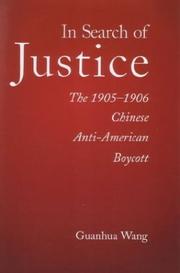
In search of justice
By Guanhua Wang
Subjects: Chinese Americans, Politics and government, China, foreign economic relations, united states, Immigrants, united states, Chinese americans, Anti-Americanism, Immigrants, Foreign economic relations, Relations, United states, foreign economic relations, china, Boycotts, Social conditions, History, United states, social conditions, 1865-1945
Description: "Enraged by the harassment and humiliation of Chinese immigrants in the United States and by increasingly harsh U.S. exclusionary policies, activists in cities and small towns throughout China launched a boycott against American products in May 1905. Was this popular outburst symptomatic of a domestic "nationalist awakening," as historians of modern China have claimed, or was it the result of pressure from the Chinese overseas, suffering under discriminatory U.S. immigration laws, as students of American history have contended? How did a nationwide mass movement arise in late Qing China, still largely bound by parochial ties of family, clan, and native place?". "In Search of Justice considers these opposing views but looks further, situating the boycott within a social movement framework and identifying the broad coalition of interests that shaped its strategy, objectives, and outcome. According to Wang, the boycott was less an expression of nationalism than the product of structural changes during the latter half of the nineteenth century - including expanded market connections, the advent of telegraph services and a daily press, and the emergence of various kinds of trade and native-place associations, literary groups and study societies, women's organizations, and chambers of commerce - all of which provided new ways to engage in more effective joint action. Through this common experience, participants laid the groundwork for future reform and revolution."--BOOK JACKET.
Comments
You must log in to leave comments.